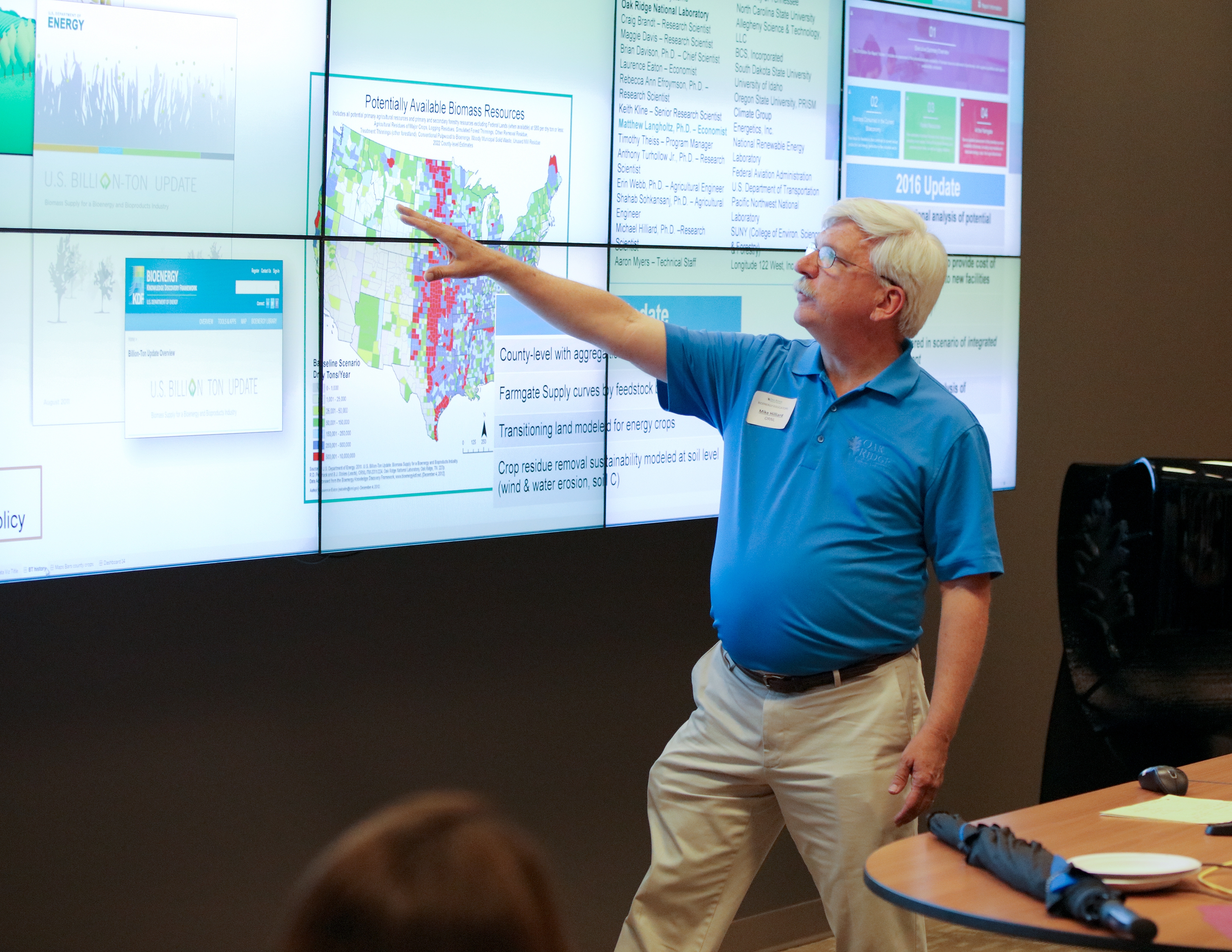Bioenergy Technologies
Oak Ridge National Laboratory brings together experts from across scientific disciplines to analyze all aspects of the bioenergy supply chain—from biomass resources to the environmental sustainability of a fully developed bioeconomy. Current research focuses on conducting resource assessment and analysis, investigating methods to reduce logistics costs for the bioenergy industry, determining best management practices for socioeconomic and environmental sustainability, ensuring infrastructure and biorefinery materials are compatible with bio-oils, developing biocomposites for 3D printing, and developing new technologies to enable lower-cost conversion of biomass to biofuels and bioproducts.
This ORNL research is funded primarily by the DOE Bioenergy Technologies Office with additional support from Laboratory Directed Research Funds, US Department of Agriculture, and industry partners. Researchers with ORNL’s Bioenergy Technologies Program also collaborate frequently with the Center for Bioenergy Innovation, which is funded by the DOE Office of Science.
Feedstock Supply & Logistics
ORNL’s expertise in resource assessment and economics led to the production of DOE’s first Billion-Ton Study with the Department of Agriculture in 2005. Updated again in 2011 and 2016 to evaluate the economic and environmental sustainability of large-scale production and collection of biomass for bioenergy, these reports confirmed the feasibility of US lands supplying a billion dry tons of biomass annually. Current R&D focuses on developing advanced modeling and data tools to study biomass industry deployment scenarios and examining the potential environmental effects of producing increased amounts of biomass for a national bioeconomy.
ORNL data and visualization tools, along with data from other contributors, are available for use by government, industry, academia, and the public on the DOE Bioenergy Knowledge Discovery Framework.
Analysis and Sustainability
The Center for BioEnergy Sustainability is a leading resource for dealing with the environmental impacts and the ultimate sustainability of biomass production for conversion to biofuels and bio-based products. Its purpose is to use science and analysis to understand the sustainability (environmental, economic, and social) of current and potential future bioenergy production and distribution; to identify approaches to enhance the long-term viability of bioenergy; and to serve as an independent source of the highest quality data and analysis for bioenergy stakeholders and decision makers.
Conversion Technologies
ORNL researchers invent, evaluate, and improve processes and technologies that increase efficiency in the production of biofuels and bioproducts from renewable sources. Areas of focus include upgrading of ethanol to hydrocarbons, advanced separation technologies, such as novel membranes, and new catalysts for bio-oil conversion.
Using the laboratory’s high-performance computing capabilities, researchers are modeling conversion processes from the atomic to the reactor scale to increase fundamental understanding of the reactions occurring during biomass conversion. These models accelerate the optimization of conversion processes and the development of novel materials.
Materials Compatibility
ORNL uses its wealth of materials expertise to develop new understanding and new materials that prevent materials degradation issues from limiting biomass conversion technologies. In collaboration with industry, universities, and other laboratories, ORNL scientists conduct laboratory corrosion tests of candidate structural materials in bio-oils and examine components removed from biorefineries and other biomass systems to determine the extent of degradation of the components by the operating environments. Research includes the development of corrosion-resistant alloys and new mitigation strategies to prevent or reduce corrosion.
Before new biofuels are introduced in the marketplace (including new concentrations of ethanol in gasoline), their effects on vehicles and the fueling infrastructure must be determined. ORNL researchers conduct studies to determine the compatibility of new fuels with vehicle technologies and with materials commonly used in fuel pumps and storage facilities.
Bioderived Materials
By integrating basic and early-stage applied research capabilities, ORNL is leading the way to developing new bioderived materials for use in large-scale additive manufacturing. Scientists have 3D printed components using resins and fibers from poplar, switchgrass, pine, flax, and bamboo. Researchers are using fundamental plant and materials science to experiment with renewable feedstocks and optimize them for additive manufacturing. The goal of this work is to improve economic viability of biofuel supply chains by integrating a new coproduct, biocomposites for 3D printing.



